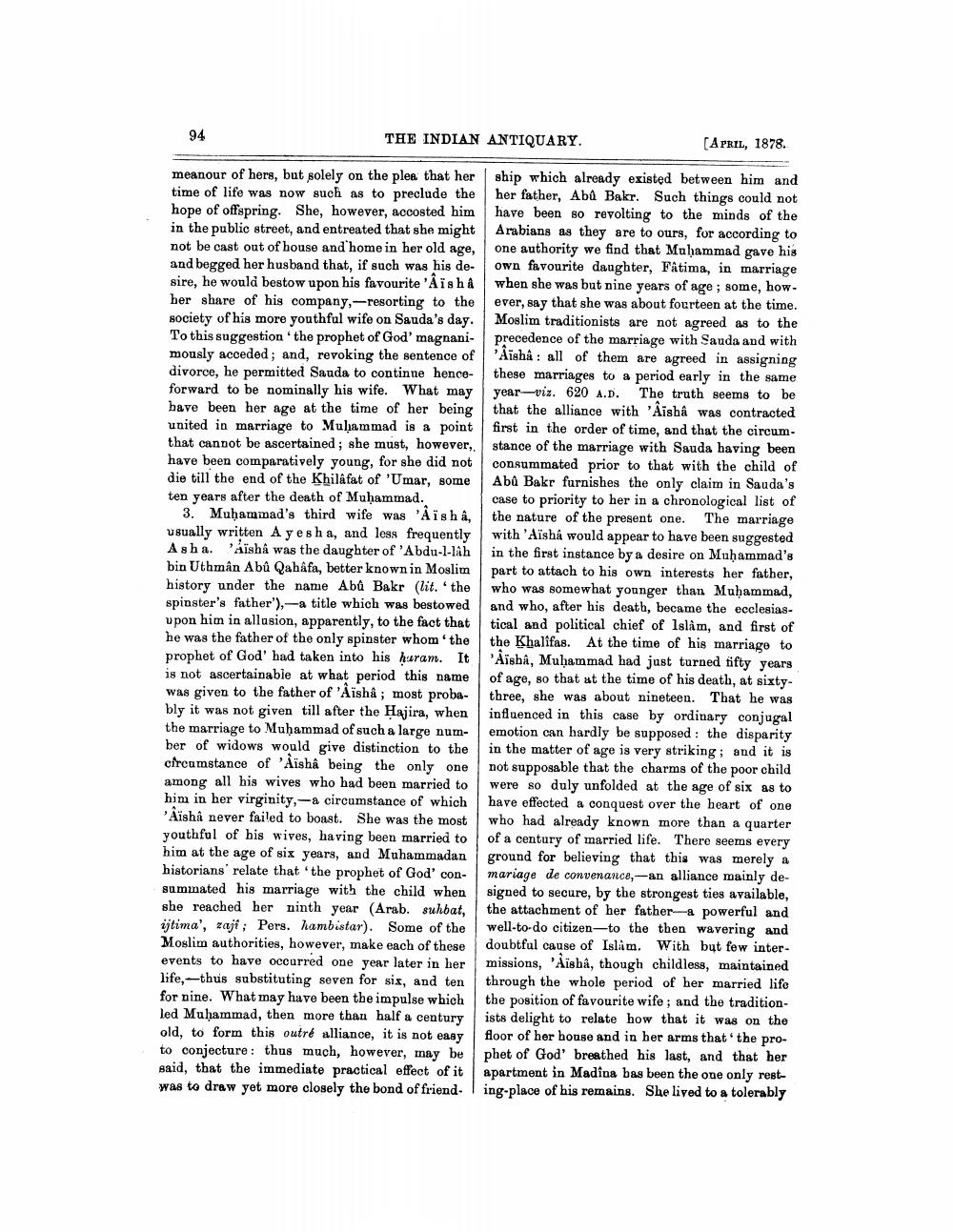________________
94
THE INDIAN ANTIQUARY.
(APRIL, 1878.
meanour of hers, but solely on the ples that her ship which already existed between him and time of life was now such as to preclude the her father, Abu Bakr. Such things could not hope of offspring. She, however, accosted him have been so revolting to the minds of the in the public street, and entreated that she might Arabians as they are to ours, for according to not be cast out of house and home in her old age, one authority we find that Muhammad gave his and begged her husband that, if such was his de- own favourite daughter, Fâtima, in marriage sire, he would bestow upon his favourite 'Aisha when she was but nine years of age ; some, how. her share of his company, -resorting to the ever, say that she was about fourteen at the time. society of his more youthful wife on Sauda's day. Moslim traditionists are not agreed as to the To this suggestion the prophet of God' magnani- precedence of the marriage with Sauda and with mously acceded; and, revoking the sentence of Aisha: all of them are agreed in assigning divorce, he permitted Sauda to continne hence- these marriages to a period early in the same forward to be nominally his wife. What may year-viz. 620 A.D. The truth seems to be have been her age at the time of her being that the alliance with 'Aisha was contracted united in marriage to Muhammad is a point first in the order of time, and that the circumthat cannot be ascertained; she must, however, stance of the marriage with Sauda having been have been comparatively young, for she did not consummated prior to that with the child of die till the end of the Khilafat of 'Umar, some Abd Bakr furnishes the only claim in Sauda's ten years after the death of Muhammad.
case to priority to her in a chronological list of 3. Muhammad's third wife was 'Aisha, the nature of the present one. The marriage usually written Ayesha, and less frequently with 'Aisha would appear to have been suggested Asha. 'Aïsha was the daughter of 'Abdu-l-lah in the first instance by a desire on Muhammad's bin Uthmân Abû Qabáfa, better known in Moslim part to attach to his own interests her father, history under the name Abu Bakr (lit. the who was somewhat younger than Muhammad, spinster's father'),-a title which was bestowed and who, after his death, became the ecclesiasupon him in allusion, apparently, to the fact that tical and political chief of Islam, and first of he was the father of the only spinster whom the the Khalifas. At the time of his marriage to prophet of God' had taken into his haram. It 'Aisha, Muhammad had just turned tifty years is not ascertainable at what period this name of age, so that at the time of his death, at sixtywas given to the father of 'Aisha; most proba- three, she was about nineteen. That he was bly it was not given till after the Hajira, when influenced in this case by ordinary conjugal the marriage to Muhammad of such a large num- emotion can hardly be supposed the disparity ber of widows would give distinction to the in the matter of age is very striking; and it is circumstance of 'Aishâ being the only one not supposable that the charms of the poor child among all his wives who had been married to were so duly unfolded at the age of six as to him in her virginity,--a circumstance of which have effected a conquest over the heart of one Aïshî never failed to boast. She was the most who had already known more than a quarter youthful of his wives, having been married to of a century of married life. There seems every him at the age of six years, and Muhammadan ground for believing that this was merely a historians' relate that the prophet of God' con- mariage de convenance,--an alliance mainly desummated his marriage with the child when signed to secure, by the strongest ties available, she reached her ninth year (Arab. suhbat, the attachment of her father-a powerful and ijtima', zaji; Pers. hambistar). Some of the well-to-do citizen-to the then wavering and Moslim authorities, however, make each of these doubtful cause of Islam. With but few interevents to have occurred one year later in her missions, 'Aisha, though childless, maintained life,-thus substituting seven for six, and ten through the whole period of her married lifo for nine. What may have been the impulse which the position of favourite wife; and the traditionled Muhammad, then more than half a century ists delight to relate how that it was on the old, to form this outré alliance, it is not easy floor of her house and in her arms that the proto conjecture: thus much, however, may be phet of God' breathed his last, and that her said, that the immediate practical effect of it apartment in Madina bas been the one only restwas to draw yet more closely the bond of friend. I ing-place of his remains. She lived to a tolerably




